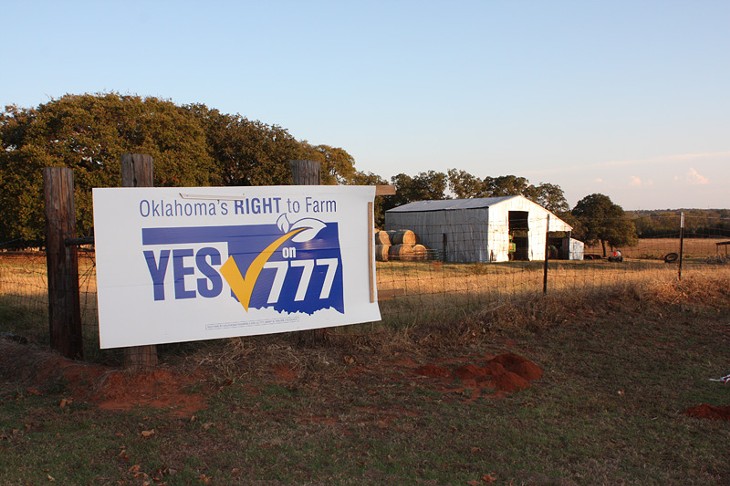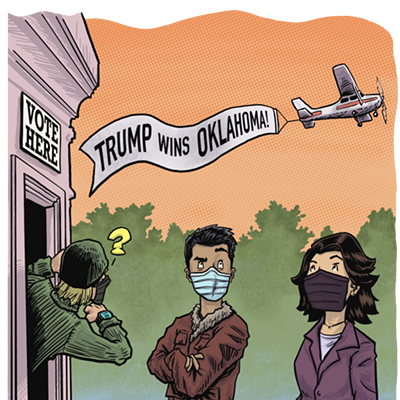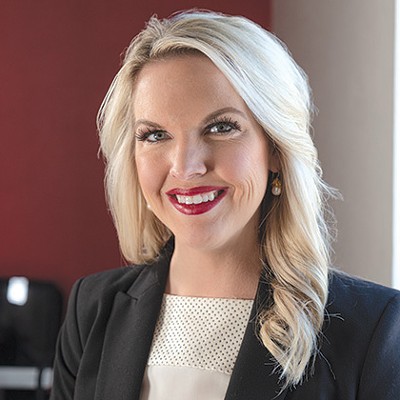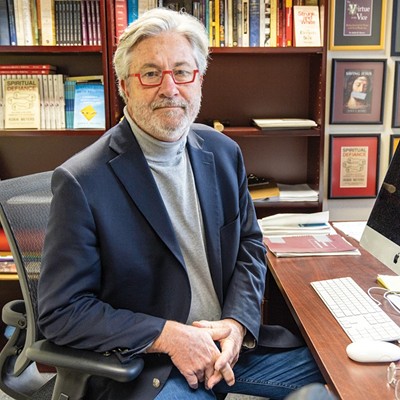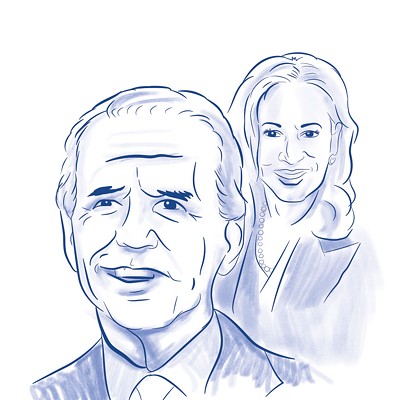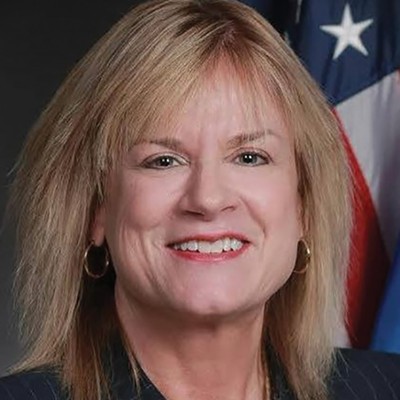Read more Oklahoma Gazette election coverage here and here.
Bud Scott has put miles on his vehicle, driving on interstates, state highways and main streets into Oklahoma communities. He passes crops and cattle, courthouses and community centers.
Over the past few months, Scott has spoken in Ardmore, Enid, Lawton, Norman, Oklahoma City, Tulsa, Vinita, Woodward and everywhere in between on State Question 777, a proposed amendment to provide constitutional protections to farmers and ranchers. His message never alters as he encourages people to vote no.
Scott represents Oklahomans for Food, Farm & Family, a group formed to oppose the measure dubbed “Right to Farm” by supporters. At forums and community meetings, Scott begins by reading the language that would be added to the Oklahoma Constitutional Bill of Rights, which enumerates the rights of all state residents, if voters passed the question.
The proposed law begins, “To protect agriculture as a vital sector of Oklahoma’s economy, which provides food, energy, health benefits, and security and is the foundation and stabilizing force of Oklahoma’s economy, the rights of citizens and lawful residents of Oklahoma to engage in farming and ranching practices shall be forever guaranteed in this state.”
“I think everyone agrees with that,” said Scott, who grew up on a farm in Enid and, as an attorney, advocates for Oklahoma’s family farms. “It’s a good premise, but the real devil is in the details with the second sentence.”That next sentences reads, “The Legislature shall pass no law which abridges the right of citizens and lawful residents of Oklahoma to employ agricultural technology and livestock production and ranching practices without a compelling state interest.”
Typically, that’s where the back-and-forth dialogue between proponents and opponents begins. Opponents like Scott say the last part of the proposal is vaguely written. He points out no definitions of agriculture technology, livestock procedures and ranching practices are listed. More importantly, he said, the first six words remove core constitutional value of democracy: the right for people to legislate.
“It takes the power out of the hands of those duly-elected representatives and turns it over to the courts,” Scott said. “I don’t think anyone supports that.”
Preserving future
Charlie Swanson, a third-generation cattle producer in southwest Oklahoma, backs SQ 777. The measure earned his support when Rep. Scott Biggs, R-Chickasha, filed legislation to create a constitutional amendment protecting farming and ranching practices. The legislation sat for two years before finding success in 2015, rolling through with only 13 lawmakers voting against it. Ten months after Missouri voters approved similar constitutional farming protections, Gov. Mary Fallin signed off on the ballot title to put the legislation before Oklahoma voters on Tuesday.As president of the Oklahoma Cattlemen’s Association, Swanson has heard praise from Missouri cattlemen and believes the Oklahoma measure would secure the legacy of farming and ranching.
“It ensures that farmers and ranchers will continue to have the right to farm in a scientific and animal husbandrylike manners for generations to come,” Swanson said. “No outside sources would come in and tell us how to farm and ranch based on emotions rather than research.”
Stewardship is a duty upheld by agriculture professionals as they work daily to be servants to animals, land, plants and water. Swanson said decisions about free-range livestock and organic livestock production are up to and should remain with the farmer and should not be determined by government or by out-of-state special interests groups like The Humane Society of the United States.
“To say all cattle should be free-range, well, that’s an opinion,” Swanson said.
Strips democracy
Long before Drew Edmondson launched Oklahoma Stewardship Council to gain support for a “no” vote on SQ 777, he was the state attorney general for 16 years.Had the constitutional protections been in place during Edmondson’s tenure as the chief legal advisor to state government, at least one attorney general’s opinion might have failed to come to fruition.
In 1996, during the hog farm industry boom, he handed down an opinion that brought due process to neighbors with concerns over corporate hog farms development. Neighbors were guaranteed the right to voice concerns about things like odor and water quality in a hearing in front of the state agriculture board.
“I don’t think we could have gotten away with that if SQ 777 had been on the books,” he said.Oklahoma Stewardship Council, a campaign with support from The Humane Society of the United States and other animal groups, warns the measure harms citizen health and the environment.
“This constitutional amendment is absolutely and totally unnecessary,” Edmondson said after pointing out the right to farm and ranch was established at statehood. “It carries inherit dangers and inherit harms that threaten our water, our health and our safety.”
Edmondson believes those three areas are in jeopardy because the measure prohibits state and local lawmakers from setting agriculture standards in areas such as sludge use, pesticide or owning female chickens within city limits unless there’s a compelling state interest.
Oklahoma lawmakers included the wording “compelling state interest,” which is the toughest standard known to law and is absent from the Missouri law.
“This sets a bar so high, it is almost accurate to say that there would be no more regulations,” he said. “It is equivalent to ‘beyond a reasonable doubt’ in criminal law. It’s a burden that is used to protect personal rights under the Constitution, like your freedom of religion.”
A frequent question Edmondson hears is how the law impacts federal regulations and laws, specifically agencies like the U.S. Department of Agriculture and U.S. Environmental Protection Agency.
“When I hear farms complaining about the bureaucracy and the agencies bothering them, they are talking about the federal government, not the state,” he said. “This will not protect from federal intervention.”
For or against
Oklahoma Farm Bureau, American Farmers & Ranchers, Oklahoma Pork Council, Oklahoma Wheat Growers Association, federal lawmaker U.S. Sen. Jim Inhofe and others join Oklahoma Cattleman’s Association in support of SQ 777. Supporters say the measure protects future agriculture.“It really bothers me that so many people have come out against it,” Swanson said.
Swanson believes opponents obscure the issues with dialogue about water quality and campaign pitches claiming corporate agriculture endorses the measure. He said Oklahoma Department of Environmental Quality, Oklahoma Water Resources Board and federal EPA regulate water. He said he doesn’t believe those agencies would face any barriers if the state question passes.
“SQ 777 will be good for all agriculture, large or small, organic to cage-free,” Swanson said. “SQ 777 will benefit the consumer more than anybody.”
Those against the measure include the Oklahoma Farm & Food Alliance, Sierra Club, Save the Illinois River, Oklahoma Municipal League, Oklahoma Conference of Churches and many cities and tribes.
Oklahoma’s agricultural future comes from its citizens’ ability to lobby elected officials — state or local — on matters like agriculture technology, livestock procedures and ranching practices, Scott said.
That’s why he encourages voters to review the exact language, which is not part of the ballot title.
“The very idea that we want to restrict our freedom of speech is down right un-American and unconstitutional,” Scott said.
Ballot Title for State Question 777
This measure adds Section 38 to Article II of the Oklahoma Constitution.The new Section creates state constitutional rights. It creates the following guaranteed rights to engage in farming and ranching:
>> The right to make use of agricultural technology
>> The right to make use of livestock procedures, and
>> The right to make use of ranching practices.
These constitutional rights receive extra protection under this measure that not all constitutional rights receive. This extra protection is a limit on lawmakers’ ability to interfere with the exercise of these rights. Under this extra protection, no law can interfere with these rights, unless the law is justified by a compelling state interest-a clearly identified state interest of the highest order. Additionally, the law must be necessary to serve that compelling state interest.
The measure — and the protections identified above — do not apply to and do not impact state laws related to:
>> Trespass,
>> Eminent domain,
>> Dominance of mineral interests,
>> Easements
>> Right of way or other property rights, and
>> Any state statutes and political subdivision ordinances enacted before December 31, 2014.
SHALL THE PROPOSAL BE APPROVED? FOR THE PROPOSAL – YES AGAINST THE PROPOSAL – NO
If approved, Section 38 would be added to Article II of the Oklahoma Constitution:
To protect agriculture as a vital sector of Oklahoma's economy, which provides food, energy, health benefits, and security and is the foundation and stabilizing force of Oklahoma's economy, the rights of citizens and lawful residents of Oklahoma to engage in farming and ranching practices shall be forever guaranteed in this state. The Legislature shall pass no law which abridges the right of citizens and lawful residents of Oklahoma to employ agricultural technology and livestock production and ranching practices without a compelling state interest.
Nothing in this section shall be construed to modify any provision of common law or statutes relating to trespass, eminent domain, dominance of mineral interests, easements, rights of way or any other property rights. Nothing in this section shall be construed to modify or affect any statute or ordinance enacted by the Legislature or any political subdivision prior to December 31, 2014.
Print Headline: Sowing debate, Law language of hotly debated State Question 777 is a major issue for opponents, as supporters preach its protections.

